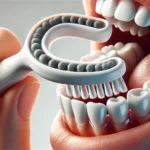As an Amazon Associate. I earn from qualifying purchases
Welcoming a newborn into the world brings a jubilant mix of joy, wonder, and a healthy dose of parental apprehension. One of the earliest milestones that new parents eagerly await while bracing for the storm is the advent of baby’s first teeth. This momentous event is often accompanied by a host of questions, one of the foremost being, do babies’ gums bleed when they cut teeth?
Teething is a natural process that occurs when your baby’s first set of teeth start to emerge through their gums. It typically begins around six months of age, but it can vary from child to child. Some infants may experience teething symptoms as early as three months, while others may not start until after their first birthday. Despite the varying onset of teething, it is a milestone that all infants will eventually reach.
The answer to whether babies’ gums bleed when they cut teeth is a resounding yes and no. The truth is that some amount of bleeding may occur during the teething process, but it is usually minimal and nothing to worry about. This bleeding is caused by the pressure of the tooth pushing through the gums, which can cause tiny blood vessels to rupture.
Fortunately, this bleeding is generally very minor and often goes unnoticed. In most cases, it will stop on its own without any need for intervention. However, if you do notice excessive or prolonged bleeding, consulting with your pediatrician is always a wise decision.

Common Concerns of New Parents
New parents, especially, are fraught with questions. Will it be painful for the baby? Can it cause fever or diarrhea? And of course, does it involve bleeding? These concerns are not unfounded. Many parents report that their babies experience discomfort during teething, resulting in fussiness, irritability, and difficulty sleeping. These symptoms can understandably cause distress to parents who want nothing but the best for their little ones.
While it is true that teething can cause some temporary discomfort for your infant, it is essential to remember that every baby is different. Some may go through this stage without any noticeable symptoms, while others may exhibit more pronounced signs of discomfort. The good news is that there are many ways you can alleviate your baby’s teething woes.
Why Do Babies Teethe?
Teething is a natural process that occurs because your baby’s teeth are developing and need to break through their gums. The pain and discomfort experienced during this time are due to the pressure caused by the tooth pushing through, as well as inflammation of the gum tissue. It is important to note that teething does not cause fever or diarrhea directly. However, the excess drooling that often accompanies teething can lead to loose stools and rashes around the mouth, which can be mistaken for diarrhea.
Symptom Spotlight: The Harbingers of Teething
Each baby’s teething experience is unique, but there are a handful of symptoms that are particularly common:
- Irritability: This is one of the most frequently reported teething symptoms. Your baby may become fussier than usual and have trouble sleeping.
- Excessive Drooling: Due to increased gum sensitivity, your baby may drool excessively during the teething process. This can cause rashes and chapping around the mouth.
- Gum Swelling: As your baby’s tooth pushes through the gums, they may become swollen and tender. You may even be able to see a small white bump beneath the surface of the gum.
- Rubbing the Ears and Cheeks: The nerves in the gums are connected to other parts of the body, including the ears and cheeks. Your baby may rub or tug at their ears or cheeks as a way to relieve some discomfort.
Do Babies’ Gums Bleed During Teething?
It’s not uncommon for parents to notice a small amount of blood around the time their baby’s teeth erupt, but this doesn’t mean that the gums are actively bleeding due to the teeth cutting through. It’s more likely related to other teething symptoms and the increased blood flow to the gum tissue to facilitate the tooth coming through.
Tips for Managing Bleeding Gums During Teething
First and foremost, do your best not to panic. Infants have an incredible capacity to heal, and a little bit of blood does not necessarily indicate a severe problem. Here are some strategies to help manage the situation:
- Use a cold washcloth: Providing your baby with a cold, damp washcloth to bite on can help soothe the gums and reduce inflammation, and gentle pressure can ease the teething process.
- Try a teething ring: A solid teething ring offers a similar soothing effect while also providing a counter pressure to the emerging tooth.
- Maintain oral hygiene: Gently wipe your baby’s gums and any erupted teeth with a clean, moist gauze pad to keep the area clean and free from bacteria.
When to Seek Medical Advice
While occasional bleeding during teething can be normal, there are certain instances where it’s best to consult a healthcare professional. Look out for these signs of teething complications:
- Severe or prolonged bleeding: If the bleeding is significant or doesn’t stop after a few minutes of applying gentle pressure, seek medical attention immediately.
- High fever and diarrhea: Although low-grade fevers during teething are common, high fevers and diarrhea can be signs of an illness not related to teething.
- Refusal to eat or drink: If your baby’s feeding habits change and they refuse to eat or drink, something more than the typical teething symptoms could be at play.
The Importance of Consulting a Pediatrician

As a new parent, it’s normal to have many questions and concerns about your baby’s health and development. Consulting with your pediatrician can provide you with the peace of mind and guidance you need during this exciting but challenging time. They can also rule out any underlying issues that may be causing excessive bleeding or other concerning symptoms.
Pain Relief Ways
Pain relief for teething babies is critical, and there are several methods and products available, such as over-the-counter options like infant acetaminophen or ibuprofen. However, always consult your pediatrician before administering any medication to your baby, even over-the-counter ones.
Over-the-Counter Remedies
If your pediatrician gives the go-ahead, a small dose of over-the-counter pain relievers can offer significant relief. Remember to follow their instructions carefully and use the appropriate dosages.
Natural Remedies
For parents who prefer to avoid medication, there are natural remedies to explore. Some options include:
- Chilled foods: Cold foods like applesauce or yogurt can provide a cooling effect and help soothe your baby’s tender gums.
- Massage the gums: Gently massage your baby’s gums with a clean finger can provide some comfort. Be sure to clean your hands!
Teething Gels and Homeopathy
Teething gels containing a mild numbing agent can also help relieve discomfort. Some parents turn to homeopathic remedies, such as chamomilla or belladonna, for relief. Always use these with caution, as the FDA has issued warnings against certain teething gels containing benzocaine due to potential health risks.
Tips for Parents
The teething period is a marathon, not a sprint. It requires patience and understanding, coupled with a healthy dose of resilience. Here are some tips to help you and your baby whether the teething storm:
- Expect the unexpected: Each baby will teethe differently, so be prepared for a variety of symptoms and approaches to comfort.
- It’s okay to be rattled: If the relentless crying or discomfort begins to wear you down, don’t be afraid to take a breather. Asking for help from a family member or friend can do wonders for your peace of mind.
- Take care of yourself: In the rush to help your baby, don’t forget to take care of yourself. Good nutrition, proper rest, and some self-care can fortify you for the caregiving marathon.
Conclusion
Teething can be a trying and messy phase, but it’s nothing new parents can’t handle with the right knowledge and support. Bleeding gums during teething are typically not serious, but knowing when to seek medical advice is crucial. Your child’s pediatrician is your ally through this and all developmental stages, so don’t hesitate to reach out for guidance. And remember, this, too, shall pass (until the next tooth comes in).
FAQs
Can teething cause a high fever?
While a low-grade fever can be a common symptom of teething, high fevers are not directly caused by teething and may indicate another condition.
Should I use an amber teething necklace for my baby?
The safety and effectiveness of amber teething necklaces are not scientifically proven, and there is a risk of choking or strangulation. It’s best to consult your pediatrician before using them.
My baby’s teething symptoms are severe. What can I do?
If you feel your baby’s symptoms are severe, always trust your instincts and contact your pediatrician right away. They can help you find the best way to manage your unique situation.










